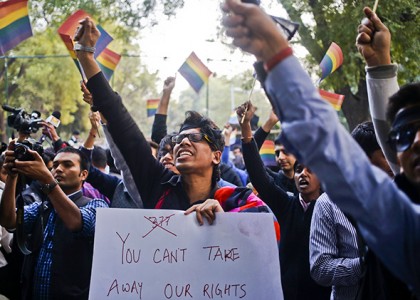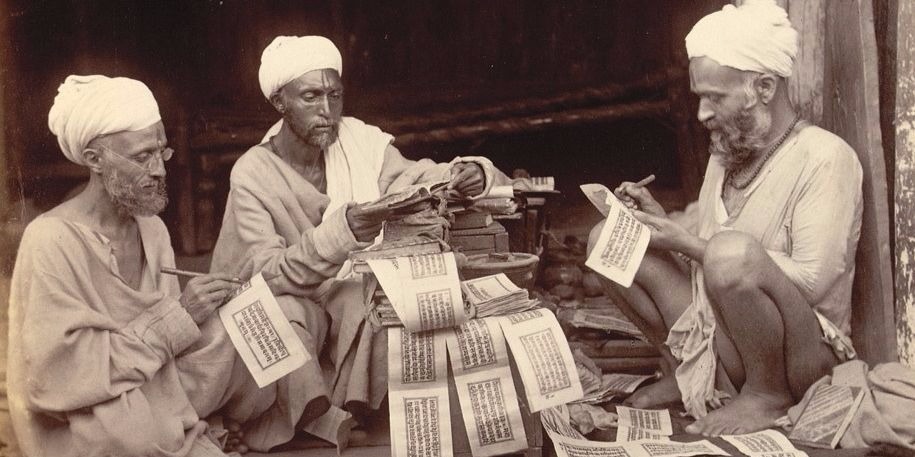Sudheesh examines the Indian Supreme Court’s recent decision to recriminalise homosexuality, and draws attention to the distinction between ‘constitutional morality’ and ‘public morality’ made by the Delhi High Court in an earlier decision.
On 11 December 2013, the Supreme Court of India recriminalised sexual acts between consenting adults of the same sex by upholding that Section 377 of the Indian Penal Code, which criminalises such acts, is valid. More precisely, it reversed the verdict of the Delhi High Court, which had earlier judged Section 377 to be invalid considering that it violated the fundamental rights to equality before law, freedom of expression, and life and liberty as enshrined in the Indian Constitution. Last week, the Indian Supreme Court dismissed a motion to review its reinstatement of Section 377. The law, in all its vagueness, states “whoever voluntarily has carnal intercourse against the order of nature with any man, woman or animal, shall be punished with imprisonment for life, or with imprisonment of either description for a term which may extend to 10 years, and shall also be liable to fine.”
In 2012 and 2013, India witnessed exuberant civil society movements, best exemplified by the India Against Corruption movement, which culminated in the electoral gains of the Aam Aadmi Party and the Lokpal Bill, and protests against the 16 December 2012 gang rape incident, which sparked rape law reforms (though marital rape continues to be non-punishable). Centred in New Delhi and drawing middle-class masses, these demonstrations placed themselves within the framework of the Constitution and sought the legal route to social change.
Delhi also served as the locus for the queer rights movement, which similarly went the legal route as epitomised by the historic Delhi High Court case. Why, then, did this movement face a moment of defeat with the overturn of the High Court verdict by justices G.S.Singhvi and Sudhansu Jyothi Mukhopadhyaya of the Supreme Court? What is so different about the queer aadmi or aurat?
If the apex court justices are to be heard, “a miniscule fraction of the country’s population constitute lesbians, gays, bisexuals or transgenders and in last more than 150 years less than 200 persons have been prosecuted (as per the reported orders) for committing offence under Section 377 IPC and this cannot be made sound basis for declaring section ultra vires the provisions of Articles 14, 15 and 21 of the Constitution.” The justices, while struggling to argue that the misuse of a law by enforcing authorities is not a premise to strike it down, could not prevent indifference to a minority group from creeping into their position, as evidenced by the lines cited above from the verdict.
We are all slaves of affects. We build logics to suit our affective positions. Little surprise, then, that the rage against corruption and rape received widespread support from the masses, and eventually from the lawmakers. Affect circulates not just through my veins and yours, but also through public life. The law, as the frame of public life, could be an easy victim to this bug. Martha Nussbaum has pointed out that the emotion of disgust has consistently crawled into many a legal system, camouflaging as logic, to justify the criminalisation of consensual same-sex acts. Indifference has been discovered in India as a diplomatic alter ego to disgust, as was evident in the Congress government’s hesitation to act on the Delhi High Court verdict and now the Supreme Court order.
Seen from this angle, Section 377 marks the codification of disgust into the Indian Penal Code (IPC) by Thomas Macaulay, a colonial officer who imported the buggery laws of the United Kingdom to India through this addition to the IPC in 1860. Thus, the law was meant precisely to punish homosexuals. The peculiarity of the Supreme Court verdict is that it lays out this historical fact in great detail, but then retreats to calling the torture of homosexuals as simply an originally unintended abuse of law. Unfortunately, the Delhi High Court’s effort to cleanse this disgust from law books has been reversed by the Supreme Court.
The Delhi High Court’s verdict, in fact, contains a neat explanation of how affects need to be watched out for, and if at all they have a place in law. The verdict says, “Popular morality or public disapproval of certain acts is not a valid justification for restriction of the fundamental rights under Article 21. Popular morality, as distinct from a constitutional morality derived from constitutional values, is based on shifting and subjective notions of right and wrong. If there is any type of “morality” that can pass the test of compelling state interest, it must be “constitutional” morality and not public morality. This aspect of constitutional morality was strongly insisted upon by Dr Ambedkar in the Constituent Assembly: “Constitutional morality is not a natural sentiment. It has to be cultivated. We must realise that our people have yet to learn it. Democracy in India is only a top dressing on an Indian soil which is essentially undemocratic.”’Ambedkar proposed that a Constitutional sentiment can replace ‘natural sentiments’. But are Indian laws so malleable?
One of the arguments raised for legitimising the natural sentiment of disgust is that legitimising gay sex could adversely impact children’s psychological development (India now has the Prevention of Children from Sexual Offences Act, obviating the need for Section 377 to deal with sexual offences against children. The presence of Section 377, in fact, could terrorise children with alternative sexualities). Section 377 is vague in terms of consensus of both persons. The Supreme Court in its verdict observes that colonial laws can be struck down in part or in full considering which portions violate the fundamental rights. Referring to a previous case made before the same Court, it observes in its verdict that “if the valid and invalid provisions (of a law) are so inextricably mixed up that they cannot be separated from one another, then the invalidity of a portion must result in the invalidity of the Act in entirety.”Unfortunately, instead of using this observation to strike down Section 377, the Court goes on to declare the Section valid, thereby failing to address the problem of disgust inherent in this law.
Any person familiar with court cases in India knows that the judiciary has historically taken up the task of determining whether laws pass the test of constitutionality. But in a move that even legal experts are perplexed by, the Supreme Court left the final decision on Section 377 to Parliament. It would be a feel-good factor to have Parliament strike down the law, as that would be seen as having the consent of the majority, or rather, the majority’s affect. However, with the BJP coming out against same-sex relationships and expressing its approval of the Supreme Court verdict, the parliamentary process will face serious roadblocks.
Now that the review petitions filed by the government and LGBT activists before the Supreme Court have been dismissed, the next legal step entails a curative petition before a full bench of the Court. The coming dayswould determine what logic or logics, embalmed in how much affect, finally form the argument for the protection of gay rights in India.
Sudheesh graduated from LSE’s Department of Social Policy in 2013.






